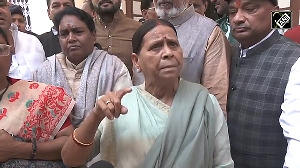India, in turn, has given its consent to Russia's entry to the WTO. This means that any other country selling products under these names will now have to pay royalties to Indian producers.
This issue has been a constant source of irritation between the two countries, as Russia had its own geographical indicators on these items.
The two countries have also decided to set up a joint group to examine the feasibility of entering into a comprehensive economic cooperation pact.
By the end of this year, the group, co-chaired by Commerce Secretary S Menon, will look for ways to increase bilateral trade turnover to $10 billion by 2010.
Announcing another breakthrough, Commerce and Industry Minister Kamal Nath said Russia had agreed to consider providing market access to Indian meat and poultry items.
Russia will also look at issues relating to higher procurement of tobacco and cigarettes from India and a joint venture between the MMTC and Russian diamond mining company, Alrosa.
However, the issue of ensuring speedy payments that are due to Indian exporters with the overall settlement of state credit, have not been settled and Nath has asked Russia to look into the matter.
"The geographical indicator issue has been part of the whole World Trade Organisation package," German Gref, Russian minister of economic development and trade said. India has given its consent to Russia's inclusion in the World Trade Organisation.
On the issue of tobacco procurement, Nath said, "Joint ventures for procuring cigarettes and tobacco from India should be allowed to be set up in Russia by any Indian company."
He urged the Russian minister to expedite the decision agreed by both sides for inclusion of MMTC in the list of regular participants for auction and tenders for selling of rough diamonds by Alrosa.







 © 2025
© 2025